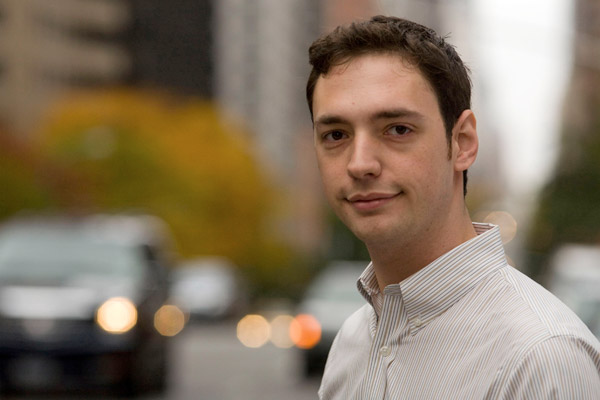November 8, 2010
Young social entrepreneur makes spare minutes matter
AAP graduate recognized by Rolex Awards for Enterprise: Young Laureates Programme.

Jacob Colker will be honored with a Rolex Award for his project that combines vol- unteering, the Internet and mobile phones to pioneer a new form of activism. Photo: Bart Michels/Rolex Awards
Jacob Colker, a graduate student in the Communications in Contemporary Society program in the Krieger School’s Advanced Academic Programs, is among the first group of young social entrepreneurs to be honored by the Rolex Awards for Enterprise: Young Laureates Programme.
On Thursday, Nov. 11, Colker and four other winners will be feted for their dedication to overcoming challenges in the fields of public health, applied technology, the environment and cultural preservation at an award ceremony at the Ecole Polytechnique Federale de Lausanne in Switzerland. Colker is the only laureate from the United States; the others are from the Philippines, Nigeria, India and Ethiopia.
Colker, who is 26, is being recognized for changing the way people get involved in community service as co-founder of the Extraordinaries, an Internet-based program allowing “microvolunteers” to use their skills and expertise online. Their flagship product is free and available to the public at www.sparked.com.
he Young Laureates Programme seeks to foster a spirit of enterprise in the next generation by giving young people the financial support and recognition they need to innovatively tackle the challenges facing humanity. The laureates, all aged between 18 and 30, will each receive $50,000 over two years, giving them time to focus on their pioneering projects and move forward in implementing them.
Colker said he will use his Rolex Award to expand microvolunteering to more Internet users and gain publicity to “encourage millions of people to volunteer.”
Colker’s project combines volunteering, the Internet and mobile phones to pioneer a new form of activism in which almost anyone with a smart phone or Web access can devote spare time to a useful charitable or scientific task. More than 40,000 microvolunteers have signed up to carry out a wide range of tasks, from helping the SETI Institute develop social media outreach materials to helping village leaders in Kenya research grant opportunities for new hospitals.
Through the www.sparked.com website, nonprofit groups can easily post questions, problems or tasks, and thousands of microvolunteers can read the posts to offer assistance. Volunteers may select from 12 areas of interest, including poverty, youth, injustice, food, politics and animals, and then decide which personal skills they will use in their spare time to help solve problems posted there.
“For the most part, traditional volunteer opportunities require a certain level of commitment. They require a commitment of time,” Colker said in a video posted on Rolex’s Young Laureates website, young.rolexawards.com. “Our approach is to help make it so easy that in the same amount of time it takes you to check Facebook or watch a YouTube video, you could actually do something worthwhile in that same five- or 10-minute chunk of time.”
A notable success for the project came in January 2010, in the aftermath of the massive earthquake in Haiti. From its headquarters in San Francisco, the Extraordinaries team engineered a website within 72 hours, enabling its volunteers to compare photos of missing people to photos taken by news agencies. The volunteers identified 24 of the missing people.
Colker said, “It was just an incredible moment, realizing, Wow, we actually found missing persons using this technology that didn’t exist before. If we can help people realize that doing good is as easy as clicking a mouse or typing a few sentences on a keyboard, my hope is that at its scale, we will have millions of people sharing their skills and expertise and helping to move humankind forward. That’s a big goal, but that’s what we wake up every single day and try to do.”

